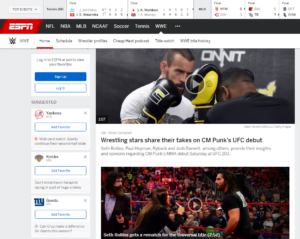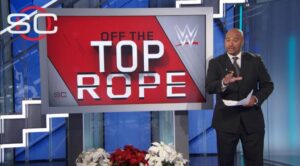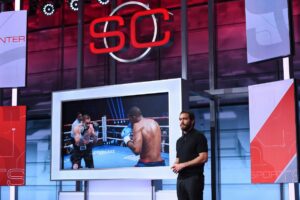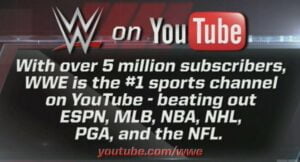I read ESPN public editor Jim Brady’s column this morning on the relationship between ESPN and the WWE and why he feels the marriage is a bad one for the worldwide leader in sports. As an individual who loves both sports and sports entertainment and has generated ratings and revenue with both, I’m going to respectfully disagree with Brady’s assertion that it’s a poor fit.
In the article, Brady cautions ESPN to be careful when crossing the line between fiction and nonfiction. He states that WWE programming is pure entertainment, whereas the world of sports provides real competition. Those points are true. Most wrestling fans though don’t watch Raw, Smackdown, or a WWE Pay Per View under any false pretenses. They know the results are pre-determined and they don’t expect to be reported on the same way that professional sports are.
However, critics who don’t like or follow professional wrestling are constantly trying to compare the two. There are subtle jabs thrown at those who enjoy it, and the most common response is “but it’s not real, it’s scripted”. Well, so is a movie but people don’t mind paying to watch them. So are most television sitcoms, dramas, and late night shows but those seem to be acceptable to watch. So why is this any different?
I’ve gone through this debate for two decades and it gets exhausting. As someone who enjoys wrestling, I have no problem if someone doesn’t like it. If it’s not your cup of tea, don’t watch it or read about it. But if I do enjoy it, why are you trying to deny me the ability to enjoy it on a channel or website that I regularly read or watch? You have your tastes, I have mine. A network like ESPN should be able to satisfy us both.
Speaking of ESPN, I’ve grown up watching it, as have most sports fans. They cover the world of sports better than anyone, and do an excellent job of separating fact from fiction. Their bread and butter is to provide information, analysis, results, and opinions on the world of sports, while protecting their image as a credible sports news organization. But let’s stop pretending for a second that the WWE has brought some form of programming to ESPN that drastically compromises what it does.
Last week, ESPN conducted multiple interviews with Robert DeNiro about his new movie “Hands of Stone”. Yes the film was about former pro boxer Roberto Duran, but the last time I checked, DeNiro wasn’t considered a source for boxing and the movie was scripted and performed by actors. I went and saw it and thought it was great, but that’s besides the point. If DeNiro can appear on multiple shows for 5-10 minutes at a time discussing his new film and his previous movies, then what is the harm in talking to a professional wrestler once a week?
It was ok for the same network to allow Will Ferrell to take over SportsCenter as Ron Burgundy. Musical acts have appeared numerous times performing live on ESPN shows to promote their new albums, and I’ve watched Jake Gyllenhaal break down the greatest boxing movies of all time while on SportsCenter to promote his film Southpaw. Nobody seemed to mind John Cena, Samuel Jackson, Jamie Foxx or Seth Meyers hosting the ESPYs. Were those not forms of entertainment that air on ESPN’s platforms? Did they damage the network’s ability to present itself as a credible news organization?
Sometimes when organizations recognize popular trends and tap into them to try to evolve their business, they’re immediately rejected by internal members who want to continue doing business the same way. I understand it. Change isn’t easy, especially when it includes leaving your comfort zone or exploring content that you lack a connection to. But if a strategic move can help a company add additional viewers and revenues, and it doesn’t deviate from the brand, then there shouldn’t be an issue.
But the WWE doesn’t fit with ESPN you say. It’s a brand of content that goes against ESPN’s journalistic integrity right? Well, let me remind you of what those four letters represent – ENTERTAINMENT and Sports Programming Network.
The very first word in ESPN’s own name is entertainment. It’s not SNN, the Sports News Network. The last time I checked, the WWE defines itself as a sports entertainment company. If the two words they use to describe their own business align with two of the words ESPN uses to define itself, then it shouldn’t be a question if there’s a fit.
The other issue I have with this discussion is that on one hand Brady wants to send a stern warning to ESPN executives about the danger of delivering wrestling content yet doesn’t see an issue with the network providing content on politics, black culture, esports, gambling, the spelling bee, and hot dog eating contests. Let’s not forget that the ESPY’s opened this year with four NBA stars standing on a stage talking about injustice, racial profiling, and troubles in America with gun violence. What exactly does that have to do with sports journalism? It was a moving moment, but one could easily argue that it’s not what fans turn to ESPN for.
If you visit ESPN’s website right now, you’ll find articles promoting Donald Trump stories right on the main page under the fivethirtyeight election section. Is this sports news? Does the selection of content fit the overall brand promise? Not at all. But it’s there.
 Having been in the sports media industry for the past two decades, I was constantly told “steer away from race, religion, and politics – they divide the audience”. I believe that statement to be true but I also think there are times where those subjects need to be explored. No better example exists than the recent controversy involving Colin Kaepernick. Which is why I don’t have an issue when ESPN explores some uncomfortable subjects.
Having been in the sports media industry for the past two decades, I was constantly told “steer away from race, religion, and politics – they divide the audience”. I believe that statement to be true but I also think there are times where those subjects need to be explored. No better example exists than the recent controversy involving Colin Kaepernick. Which is why I don’t have an issue when ESPN explores some uncomfortable subjects.
But let’s be honest, ESPN has built two separate businesses around two of those words – race and politics. And for the record, I enjoy both. I think The Undefeated provides tremendous content, and when Nate Silver analyzes political topics they’re usually a fascinating read. I’m able to separate in my mind what ESPN’s brand stands for, and what these sub-sections of their business are. But a counter argument could be made towards why they exist under the ESPN umbrella in the first place.
Whether you like the world of professional wrestling or not, it’s hard to argue with its track record of success. Their television programming delivers millions of viewers each week, and their web and social media traffic and engagement are as high as any form of entertainment. With ESPN looking for ways to connect stronger with younger viewers and readers, and searching for alternative ways to generate interest and revenue during a time where cord cutting has become a common concern, this is smart business. If it isn’t compromising the core of ESPN’s business, which it isn’t, then I have no problem with it.
I’ve seen first hand how strong of a difference these fans can make. Earlier in my career I hosted a weekly wrestling talk show in upstate NY on local radio. I was under no grand illusions that my program was going to become a 5-day per week program, and I saw the show for what it was, two hours of entertainment.
Some didn’t like the program being on the air because it conflicted with the identity of the radio station. I felt it deserved a place at the table. In the end, the results proved it belonged. Over the span of two years while hosting the show on a sports station and rock station, ratings spiked 144%. I was stunned when I saw the data, but it confirmed that we had a niche product with a very passionate and dedicated audience. That passion led to additional revenues.
As a result of hosting that show, I traveled one year to Toronto for WrestleMania 18 and it was then that I discovered that TSN (the ESPN of Canada) promoted the WWE on its SportsCentre program. I watched as TSN aired highlights of The Rock vs. Hulk Hogan at WrestleMania on their Sunday night highlight show and I was surprised. I then learned that they also carried Monday Night Raw for over a decade on Monday night’s. That’s something that you’d never expect a leading sports channel to do. If TSN’s staff and its viewers were able to make the distinction between sports and sports entertainment, then I have no doubt that American sports fans can too.
If you look at the current sports media landscape as it applies to this conversation, you’ll find that CBS Radio recently started airing former pro wrestler Taz’s show following the WWE’s top pay per views on Sunday night’s on many of their top local sports radio stations across the country. They wouldn’t be doing it if it wasn’t a smart business decision.
And why wouldn’t they put the show on after a PPV on a Sunday night? The audience is usually small during that time, and by tapping into this audience, CBS’ stations are likely to experience a spike in their ratings and revenue. Sports radio listeners are not going to stop listening to the weekday shows on WFAN, 670 The Score, WIP, 98.5 The Sports Hub or 97.1 The Ticket because of it.
I look at it like this. ESPN is a tree with many branches. The WWE occupies one of those branches just like many others. If someone doesn’t like the WWE section on ESPN.com or the interviews that Jonathan Coachman conducts on Tuesday night’s edition of SportsCenter, there’s a simple solution – don’t read or watch them. You DO have a choice. But remember, ESPN wouldn’t be exploring this space if it didn’t increase web traffic, and television ratings, which of course influence their ability to generate more revenue.
I understand the fine line that ESPN has to walk in trying to blend real news and results with entertainment. I agree with Brady on WWE news being kept separate from the main news section. If people want to know what’s happening in the WWE they can go to the WWE section for it. That shouldn’t be a focus on ESPN’s main page. The only exception is when coverage is warranted. For example, that’ll be the case this Saturday night when former WWE star CM Punk makes his debut in the UFC.
He also points out that the SportsCenter treatment of WWE, where one fixed segment per week takes place with Coachman, a former WWE commentator, fits with the show’s strategy of encouraging their anchors to display their personal passions in order to better connect with fans. That makes sense and is important because viewers are attracted to personalities more than talking heads.
But that’s also where I become confused.
One minute Brady is pointing out that the partnership creates journalistic challenges for the network and is a poor fit that presents real risk. The next minute he’s acknowledging that there’s a path available that makes sense, which is to do exactly what ESPN is already doing by keeping the WWE content in its own section, and including their superstars on SportsCenter one time per week. If they venture outside of that box, as they did with having John Cena host the ESPY’s or by doing live hits from WrestleMania and last year’s Summerslam, then those too will have to make programming sense.
In my opinion this comes down to the same old discussion. Those who don’t like pro wrestling and see it as a joke, will always be offended when it earns exposure. Brady acknowledges during his article that he doesn’t watch it, which means he’s not going to share the viewpoint of someone who does. Sports Illustrated’s Richard Deitsch for example is a big wrestling fan, and he’ll invest time on his podcast and articles talking about wrestling issues that peak his interest, but he doesn’t let his affinity for the WWE compromise his ability to be a journalist, and nobody is asking that of ESPN either.
ESPN has built an empire out of covering sports and venturing into the entertainment space. It’s what’s helped the network become a perennial powerhouse in sports television. If they’re able to figure out how to craft content and control the presentation with celebrities, musical acts, and spelling bee and hot dog eating contestants, on ESPN.com and SportsCenter, then I have no doubt they can do the same with the WWE. Except this partnership can bring a lot more eyeballs and Benjamin Franklin’s into the company.

Jason Barrett is the Founder and CEO of Barrett Media. The company launched in September 2015 and has provided consulting services to America’s top audio and video brands, while simultaneously covering the media industry at BarrettMedia.com, becoming a daily destination for media professionals. Prior to Barrett Media, Jason built and programmed 95.7 The Game in San Francisco, and 101 ESPN in St. Louis. He was also the first sports programmer for SportsTalk 950 in Philadelphia, which later became 97.5 The Fanatic. Barrett also led 590 The Fan KFNS in St. Louis, and ESPN 1340/1390 in Poughkeepsie, NY, and worked on-air and behind the scenes at 101.5 WPDH, WTBQ 1110AM, and WPYX 106.5. He also spent two years at ESPN Radio in Bristol, CT producing ‘The Dan Patrick Show’ and ‘GameNight’. JB can be reached on Twitter @SportsRadioPD or by email at Jason@BarrettMedia.com.







